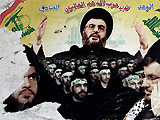Hizbollah: Governance Under Arms
By Dominic Moran for ISN
However, this external pagerenewal of debatecall_made presages neither genuine movement toward disarmament which will be voluntary should it comes in the distant future - nor a potential political crisis.
In the May 2008 Doha Agreement, Hizbollah joined all factions in agreeing not to resort to arms to solve political scores - though it is hard to believe that this pledge would hold should the Shia movement again see its basic interests as under threat.
A late 2009 external pagecoalition statementcall_made effectively sets the seal on the weapons issue through confirming the right of "Lebanon, its government, its people, its army and its resistance [Hizbollah]" to armed opposition to Israel.
For Hizbollah the utility of direct involvement in the current Lebanese government is relatively limited. It is of interest in as much as proxy control of ministerial positions prevents political rivals from enjoying a monopoly on budgets, and grants allied parties the capacity to extend their influence in their own sectarian community and over state institutions.
Also, the impact of the maintenance of a national unity government in allowing Hizbollah to avoid being painted into a corner through political isolation or Israeli attack should not be underestimated.
Hizbollah's maintenance of its arms can in fact play an important moderating role. It provides the group with the military capacity to rebuff any effort to impinge on its strategic interest in the maintenance of its parallel institutional framework and necessitates the formation of pan-sectarian political alliances. This, while encouraging involvement in national political processes as a means to avoid pressure to disarm under UN Security Council Resolution 1559.
It is important to recognize that the 2006-2008 political crisis was damaging to the movement, despite its eventual triumph. The breakdown in anti- and pro-Syrian bloc relations encouraged massive Saudi and western financial and political backing for March 14 parties and the Lebanese military while artificially bolstering anti-Syrian Christian parties at the polls in 2009, at the expense of key Christian ally, the Free Patriotic Movement (FPM).
Here, it must be remembered that Hizbollah failed to follow through on its effective pledge to secure the presidency for FPM leader Michel Aoun.
The true impact of the strengthening of the Lebanese presidency in the 2009 coalition formation period has yet to be fully felt. Nonetheless, the establishment of a bridging cabinet faction under the control of the presidency does provide Hizbollah with crucial cover for what is effectively a reassertion of its veto control over controversial government policies.
Ultimately, it is important that a discourse on the eventual disarmament of all militant groups (outside the Palestinian camps) is kept on the table, as part of a symbolic commitment to the reassertion of government suzerainty in Lebanon.
However, the best that can be hoped for in coming years is the maintenance of peaceful relations on the Israeli border and the progressive integration of Hizbollah into a strengthened consociational governance structure.

